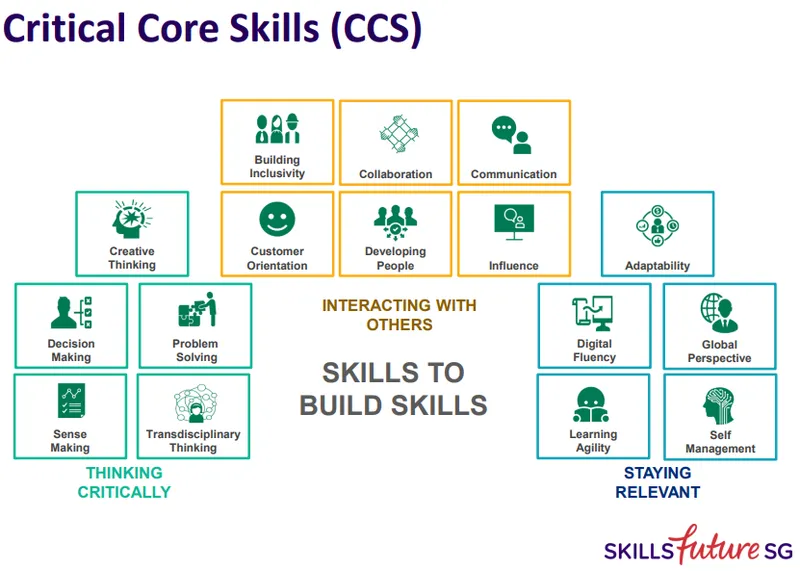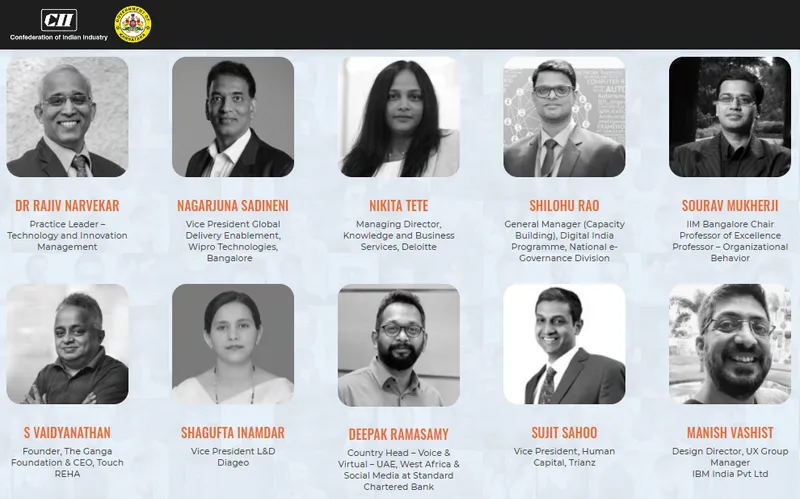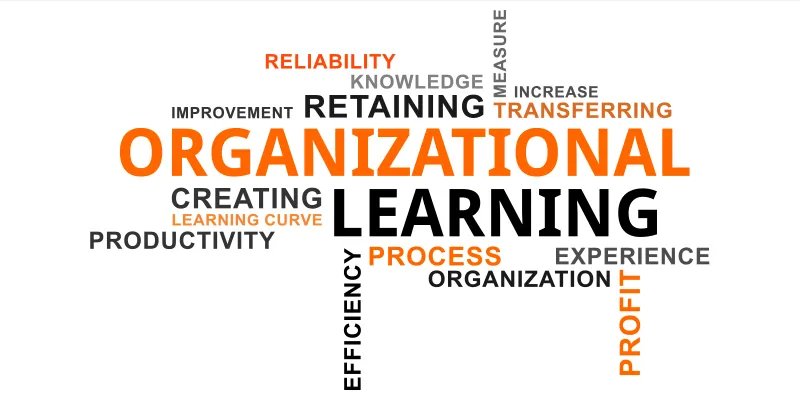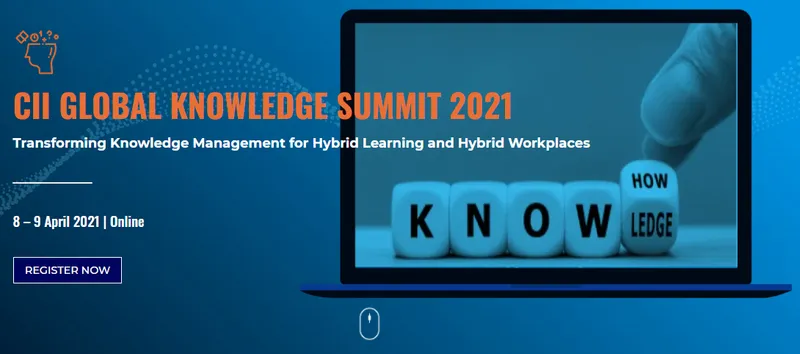Digital transformation and the future of workers – CII Knowledge Summit addresses lessons for the pandemic era and beyond
In a series of preview articles on CII’s upcoming annual summit, we share insights on organisational knowledge flows, tech tools, and business impacts.
CII’s annual Global Knowledge Summit is being held entirely online on April 8-9 this year, with the theme of Transforming Knowledge Management for Hybrid Learning and Hybrid Workplaces.
As media partner for the Global Knowledge Summits, see YourStory’s coverage of the editions from 2020 and 2019, and sessions takeaways from the Bangalore K-Community meetups.
See also our profiles of MIKE (Most Innovative Knowledge Enterprise) award winners EY, Tata Steel, Cognizant Technology Solutions, Afcons Infrastructure, Petroleum Development Oman, BINUS University, and Mobarakeh Steel Company.
In this preview article on the 16th edition of the Global Knowledge Summit, we present insights from conference speakers, organisers, and members of the partner organisation, Knowledge Management Global Network (KMGN). The summit features over 40 speakers, with seven panels and keynote sessions.
Skills and digital transformation
A number of skills have been identified as core for a fast-changing world, according to Rajesh Dhillon, President, Knowledge Management Society, Singapore (KMSG), and Co-Founder and Director, Acies Innovations.
“In 2019, the Singapore workforce skills future team, defined 16 skillsets that were required for Singaporeans to reach their full potential in the workforce and changing digital landscape (see figure). Of these three clusters were identified as essential,” he explains.

Rajesh says he resonates with the skills related to critical thinking, communications, and being up to date with the changing landscape. “These skillsets involve soft and technical skills embodying the fundamentals of managing knowledge in a fast moving borderless world,” he adds.
“Digital transformation is irreversible,” emphasises Robin Banerjee, MD of Caprihans India and author of Who Blunders and How: The Dumb Side of the Corporate World (see my book review here).
Digital transformation is about adaptation to new technology, building know-how across the organisation, and protection against cybercrimes. However, the fall of companies like Kodak shows that digital transformation is not easy because it requires business model transformation, he cautioned.
Learning to be all the more compassionate with colleagues (as well as oneself) due to the added complexity of virtual teamworking is also a key skill, according to Nirmala Palaniappan, a consultant in KM and social learning. She was earlier at TAFE, Oracle, and Wipro.
“One should reorient oneself to build camaraderie through digital mechanisms and a reasonable amount of tech-savviness – and not only depend on face to face meetings,” she adds. Written communication via asynchronous emails and documents is also important, as opposed to expecting only Zoom meetings.
“Long-term mindset, behavioural awareness, and creativity are three core skills in a digitally-transforming world,” adds Arthur Shelley, Founder of Intelligent Answers and Producer of Creative Melbourne. He is also the author of KNOWledge SUCCESSion (see my book review here).

Role of knowledge workers
The role of knowledge workers is being redefined in a world of increasing AI, automation, and machines. Knowledge workers should keep an eye on AI/ML ethics and speak up when the collective or the leadership misses something, Nirmala Palaniappan advises. “They should be able to combine and integrate conventional tasks with technology-enabled tasks and balance efficiency, scale, speed and quality of output,” she says.
“Knowledge workers should evolve technology-based practices while retaining human empathy, intuition and sense of purpose,” she adds.
“The role of knowledge workers has been revitalised. While the pandemic was hard for many organisations and industries, the need for resilience to bounce back or push ahead of the competition pushed knowledge work to the highest priority,” Rajesh of KMSG observes.
Knowledge workers embedded into business strategy provided this resilience. The focus was on leadership, culture, technology, processes, and impact, he adds.
“Knowledge is the source of ideas as well as the algorithms for the design and development of AI/ML. These disciplines cannot continue to develop without knowledge workers,” Arthur Shelley observes.

Pandemic lessons
As the world slowly moves out of the pandemic, the importance of knowledge and innovation is being accelerated in a number of domains, functions and tasks.
“The focus on KM and innovation as one entity is most important to being a smart organisation. After a year of lockdowns, it is clear that innovation is paramount for survival, and managing critical knowledge is required for innovation,” explains Rajesh of KMSG.
“Knowledge creation and flow is the foundation of innovation and development. It has always been the primary accelerator of improvement in all fields,” Arthur Shelley observes.
“What will accelerate post pandemic is the levels of comfort and capability to facilitate knowledge co-creation and flow virtually. This is due to the forced experience of virtual work during the pandemic,” he adds.
“Organisations that did not pay much attention to online collaboration and team-work enabled by technology are going to have to pull up their socks and scramble for cover by trying to quickly adapt to such technologies,” advises Nirmala Palaniappan.
She also observes that basic content management mechanisms that proved to be inefficient in the last one year are going to be subjected to scrutiny and enhanced by leaders who felt the pinch.
“Some organisations that are myopic and largely focused on profits and business growth are, however, going to continue neglecting the KM function. They may indulge in downsizing or reducing investment,” she cautions.

Future of Work
The speakers identified a number of emerging trends in the world of knowledge work. Adaptability, agile co-creation and strategic partnerships are three key trends identified by Arthur Shelley. His forthcoming book is also titled Becoming Adaptable.
“Agile cocreation approaches have increased during the pandemic, especially virtual facilitation,” he observes. Virtual collaboration tools will continue to improve as the major players seek to dominate this emerging market.
“It is likely that there will be merging of a range of tools like Zoom and Miro to form comprehensive platforms for seamless virtual collaboration,” Arthur predicts.
Nirmala Palaniappan foresees a lot more dependence on ML/AI-based business in terms of operations and solutions. “More startups in technology design and services will leverage the ecosystem, such as proliferating mobile devices,” she says.
“Hopefully, more organisations will genuinely realise that business excellence is about sustainability. It is about the Planet, People, and Purpose, and not just Profits,” she adds.
“In my view, the focus will be on data management and sensemaking for business actions. This will be followed by the traditional KM areas of collaboration, education, visualisation, and content management,” Rajesh of KMSG explains. This is relevant, especially when content needs to be sieved and filtered to enable quick and timely results.

The importance of co-creation
It is not just collaboration and cooperation, but effective co-creation that will be a success factor in an increasingly connected and complex world. “The role of co-creation is absolutely critical. Only organisations that realise this and create sustainable communities that have a clear vision and efficient way of working together will succeed in the long run,” Nirmala Palaniappan suggests.
Rajesh of KMSG observes that the term VUCA (Volatility, uncertainty, complexity and ambiguity) has been around for years. “This has been addressed with the introduction to VUCA prime: vision, understanding, clarity and agility. The gist of this is to be able to communicate and cocreate,” he explains.
“As the borders have become invisible now, organisations operate with a global workforce and clients. The need to co-create, collaborate, and communicate understanding culture, needs, and technology equates to business success,” Rajesh emphasises.
Arthur Shelley observes that the key impact of knowledge cocreation approaches in VUCA is shortening of the turnaround from idea to implementation. “This reduces risk as products become released before too much has changed. This also inevitably means shorter product/service lifecycles as expectations change more quickly,” he adds.

Employee empowerment
Looking ahead, it is imperative that leaders not just engage their employees but empower them as well. “Proactively leverage cognitive and behavioural diversity to fuel cocreation and collaboration. Develop confidence and competence to achieve this virtually,” Arthur Shelley advises business leaders.
“It was Peter Drucker who said “culture eats strategy for breakfast” – this must be always at the back of our minds. Culture is not only an employee issue; it is also a business enabler,” Rajesh of KMSG explains.
Positive workplace culture empowers staff and their behaviour, and brings in more positivity in the organisation. “This eventually leads to more workplace and business innovation. The culture which you drive in your organisation drives values, behaviours, and customer satisfaction,” he adds.
“Culture is a business leader’s top priority to ensure the business strategy is successful and that the employees are engaged and have a sense of belonging to the organisation. For your organisation to be successful it needs your 100 percent commitment,” Rajesh sums up.
“Better quality leaders who are self-aware, authentic, secure, and mature are essential for employee empowerment. HR practices should involve value-based hiring and employment of gig-workers who come together and work with efficiency and focus,” Nirmala Palaniappan advises.
An organisation’s values and vision should inspire people to be a part of it and put it high up in their list of priorities. “This should go beyond just a way to earn a living. Leaders should make their team yearn for something beyond individual desires,” she adds.
The road ahead
In sum, it is key for organisations to blend technology and human-based approaches for long-term innovation and business success.
“Smart Organisations are the way ahead. They will rely on enabling technology like machine learning and AI. Ultimately, managing a successful organisation is about people, process, and technology. That is the backbone of managing your organisations knowledge,” Rajesh of KMSG sums up.
One must shift from a focused “mindset” to an adaptable “mindFLEX,” Arthur Shelley advises. “Move from a change resistance mindset to a mindFLEX that embraces change as opportunity,” he says.
“Those who drive the change fastest and optimally leverage the available diversity of ideas and behaviours will dominate the markets,” Arthur sums up.
Edited by Teja Lele




![[Year in Review 2020] Here are the Top 5 Pivot and Persist stories about startups that changed their business models amidst COVID-19](https://images.yourstory.com/cs/2/fd6b2ee0c6f411e8af1c974e95f3b2db/shutterstock1207152979-1590084243782.jpg?fm=png&auto=format&h=100&w=100&crop=entropy&fit=crop)








